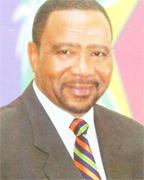PNCR-1G leader Robert Corbin yesterday rebuffed an ultimatum by President Bharrat Jagdeo, who this week threatened criminal proceedings against parliamentarians who failed to make full declarations to the Integrity Commission, saying that the party is awaiting a judgement on the legality of the appointments to the Integrity Commission.
Earlier in the week, the Alliance For Change (AFC) said it would vigorously resist any attempt to have the previously independent commission impose any authority over its members in light of what it dubbed an attempt to usurp its powers.
“The PNCR… will not be intimidated,” Corbin told reporters at a press briefing at Congress Place yesterday. “We would continue to resolutely pursue this matter in the courts.” He said that although the party’s MPs have prepared declarations for submission, they were instructed to withhold them until a decision is made by the court on a suit that was initiated since 2005. As a result, with the current commission in place he said any order made by the President under the law would be viewed as being rooted in unconstitutionality. He said: “It does put you in a very strange situation and one would have thought that such an important body in this country would influence the executive to want to ensure that that body is beyond question and it’s a pity that that has not been done.”

On Monday, Jagdeo put parliamentarians on notice that they would be expected to submit statements of income and assets to the Integrity Commission, in keeping with their obligations under the law. He gave a two-week period and said he would also urge the commission to publish the names of defaulting MPs in the national newspapers and request that the police charge defaulters in accordance with the law. Under the Integrity Commission Act, while the President does have supervisory authority over the commission and is empowered to request information from declarants and to publish their names and to hold formal enquiries, charges for breaches of the law have to be instituted by the Director of Public Prosecutions. In an interview broadcast by state-owned NCN last evening, the President expressed surprise at the reaction of the opposition.
He stressed that he was simply seeking to get them to adhere to the law and not to a presidential diktat. “This is not about what Jagdeo wants,” he said, saying the issue is about accountability and transparency in the public life.
Apart from its MPs, the PNCR has made exceptions for its members who are functioning in government offices, allowing them to be guided by their conscience on the matter of declarations. Corbin emphasised that the party has always supported the underlying principles of the creation of an independent commission, to ensure that there is probity, particularly by governmental and other public officials. But he noted the party’s “fundamental objection” to the manipulation of the commission, saying that it was unilaterally appointed in violation of the requirement for meaningful consultation with the leader of the opposition. He also questioned whether the requirement that the commissioners be appointed from among persons who have had experience and shown capacity in law, administration of justice, social service, finance, accountancy and any other discipline, was met.
In addition to the appointments, he also expressed concern about the administrative arm of the commission and whether it has been properly staffed. He added that even in the appointment of this new commission, there were “serious efforts” at “political interference” with the submissions of non-government declarants. He cited reliable information from people who worked there and claimed they were getting calls to pass on information about people’s declarations that were sent in. He added that the fact that the president can claim to have instructed the commission on what action should be taken against opposition MPs is testimony to a perception by him that the commission is nothing but a “convenient tool of the executive” to persecute members of the Opposition. [The President said all MPs, regardless of party-would be subject to the legal implications of failing to submit declarations under the law.]
Corbin repeatedly noted that although all the pleadings were before the court since December 2005, the case has been languishing in the judicial system. Taking a swipe at the president, he said one would have expected that given his “penchant for interfering with the judiciary,” he would have seen to determination of the question of the commission’s constitutionality.
The AFC has already noted that if there is a failure to comply with the law, there are certain prescribed actions that the commission may take without the instruction having to come from the head of state. It has also pointed out that the question of whether the commission is even properly constituted is a matter engaging the attention of the High Court.
AFC MP Sheila Holder yesterday expressed her worry about declarations falling into the wrong hands, noting that in the past she had gotten a personal assurance by de jure Commission Chairman, Bishop Randolph George.
The current acting Chairman is Fazeel Ferouz. “I see the acting Chairman going off with the president on business trips,” she also noted, referring to Ferouz’s accompanying the president on recent state visits to Libya and Greece. Holder said there is no arm’s length between the two to give any assurances.
Bishop George submitted his resignation since April, 2006, but it has never been acknowledged by President Jagdeo. Meanwhile, the commission’s Secretariat continues to function on a daily basis, with its main task being the collection of statements of income and assets from senior public officials and MPs.
But the legal authority of the body has been in question since its members were appointed in November 2004.





